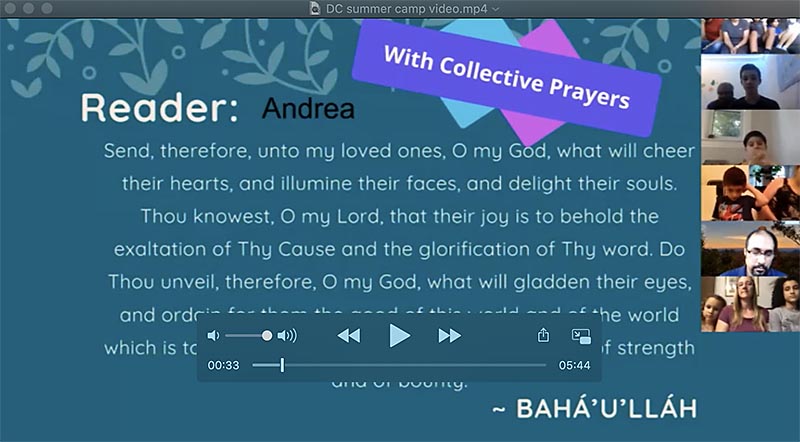



Carrying out a virtual summer camp on the internet has its challenges. But for junior youth groups, children’s classes and those who guided them in Washington, DC, the “Virtual Summer Camp” June 15–July 6 brought a lot of learning and some spiritual confirmations.
Families from four continents joined the DC participants in the video-based learning over those three weeks, inspiring some to organize their own activities. Avenues for conversation on race unity were created for all ages participating.
Of course, keeping young people focused was challenging for the teachers and mentors, especially as they were learning to adapt to the technology. But the experience strengthened their resilience and collective capacity to help each other. “We’re just really beginning to learn what technology can offer with the educational process,” says Muhammad HJ Kamit, who facilitates junior youth groups as an animator.
The DC area had prior experience with summer camps for children from Baha’i-initiated children’s spiritual education classes and middle-school-age participants in junior youth groups. But the global health crisis of 2020 presented barriers to meeting in person.


As outlined in the orientation materials, the camp’s purposes were “To empower children, middle-schoolers, and youth to contribute in impactful and long-lasting ways to the betterment of our communities”; and “As a community, learn about creating environments of unity based on diversity and love as we are addressing deeply-rooted challenges in our society and adjusting to new norms.”
Study and recreation were at the center of daily activities in the online camp. Participants were encouraged to practice prayer, study guidance on uplifting their moral character, share stories, and experiment with drama, music and drawing.
Even with a solid structure, some challenges arose from the start. While these groups had previously thrived when they met in person, Michael Sanchez, children’s class teacher, notes, “Not having that physical interaction — or, rather, that in-person interaction — takes a toll. … Losing their attention is a lot easier when there’s just a screen in front of you.”
To offer clarity and ensure a safe and productive environment, the teaching team put a “Zoom Etiquette” system in place and explained it in an orientation guide. The goal was to minimize distractions and keep the groups cohesive.
Nickole Best, a junior youth group animator, acknowledges the kids were not always engaged with the material. She praised the resilience of her teaching team, saying, “It took time for the animators and the children’s class teachers to plan. It took effort, but there was a very strong and unified team.”
Another significant confirmation, Sanchez notes, was that the virtual classroom enabled wide international participation. “Outside of the States, we had participants from South America, the UK, Ethiopia and Canada,” he said. “One of the confirmations that came from this participation was that one family in the UK saw our efforts, and was motivated to start a junior youth group in their community.”
Considering the current national discussion on race, the animators and teachers prepared for the camp by studying guidance from international and national Baha’i institutions and identifying key principles. They created study materials appropriate for the varied age groups.
Kamit notes the material was intended not to stop at dialogue, but to help the young people think about action on race. They talked together, he says, about “how this content can help reflect the realities of what this nation is going through, and empower the participants to contribute to the conversations around them regarding race unity.”


![]()
![]()
Whether you are exploring the Bahá'í Faith or looking to become an active member, there are various ways you can connect with our community.
Please ensure that all the Required Fields* are completed before submitting.